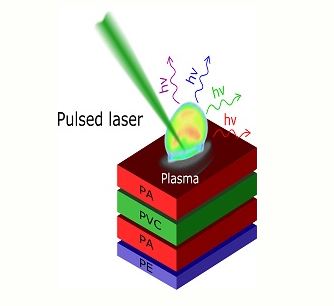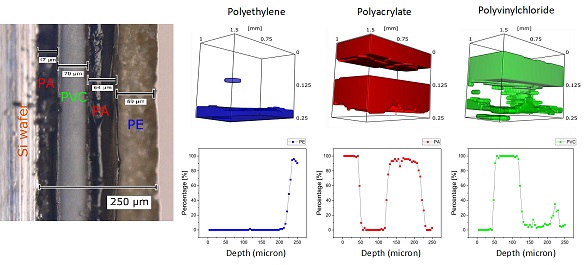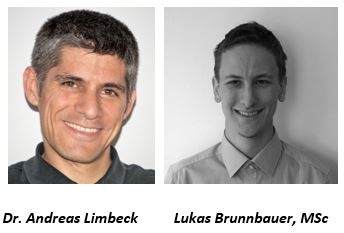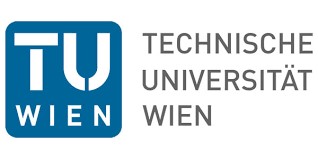Outstanding Webinar Series on Laser Ablation Chemical Analysis: Advanced Polymer Analysis Using LA-ICP-MS and LIBS
Presented by
L. Brunnbauer and A. Limbeck
TU Wien, Institute of Chemical Technologies & Analytics
Applied Spectra, Inc. invites you to attend an outstanding technical webinar on advanced polymer analysis using LA-ICP-MS and LIBS. This webinar features the research work led by Mr. Lukas Brunnbauer and Dr. Andreas Limbeck at the Institute of Chemical Technologies & Analytics of TU Wien, Vienna, Austria. Dr. Limbeck’s group performs pioneering LIBS and LA-ICP-MS research for analyzing a wide range of materials and in recent times, the group has stayed on the forefront of developing state-of-the-art LIBS and LA-ICP-MS analysis approaches for polymer samples.

Spatially resolved analysis of polymer structure using LIBS and LA-ICP-MS
The need for advanced analytical technique for polymer characterization is on the rise as the use of polymer becomes popular in packaging, electronics, construction, and automotive industry. Environmental problems associated with micro-plastics further raise the importance of having access to analytical techniques capable of performing rapid toxic metal analysis within tiny polymer fragments. While polymer samples have been traditionally analyzed by molecular spectroscopy techniques such as FTIR and Raman, the work of Dr. Limbeck’s group shows that LIBS and LA-ICP-MS data can be used independently or in combination (Tandem LA – LIBS) to provide powerful classification capability for various polymer types. And often LIBS and LA-ICP-MS data add complementary information to other analytical techniques for polymer characterization. The webinar also touches upon more advanced calibration strategies for quantification of metal content utilizing multivariate calibration to account for matrix variation among different types of polymer samples. Attend this webinar to learn this exciting advance in characterization of polymers using LIBS, LA-ICP-MS and Tandem LA – LIBS!

Identification of Polymer type in 3D Coating Structure
Webinar Schedule
Duration:1 hr
Session 1
Wednesday, July 15, 2020 7:00 AM PST-8:00 AM PST
(or 4:00 PM to 5:00 PM Vienna, Austria)
Open to all: recommended for attendees in the EU and USA
Session 2
Thursday, July 15, 2020 10:00 PM PST-11:00 PM PST
(or 7:00 AM to 8:00 AM (Jul 16), Vienna, Austria)
(or 2:00 PM to 3 PM (Jul 16), Seoul, Korea)
Open to all: recommended for attendees in the Asia, SE Asia, and Australia
Webinar Abstract
Traditional techniques used for the characterization of polymers such as FTIR and Raman spectroscopy enable investigations of polymer degradation as well as polymer classification. Other techniques used for these tasks include py-GCMS, TGA or MALDI-ToF-MS. Although well established, these techniques cannot provide full characterization as for some techniques information about the elemental composition is not accessible or they are limited to surface near regions. These shortcomings could be circumvented with the use of LA-ICP-MS and LIBS, which allow elemental analysis but also the measurement of depth profiles. Moreover, characteristic regions in the LIBS spectrum can be used to gain molecular information.
In this presentation, we demonstrate the advantages of combined LA-ICP-MS/LIBS analysis for advanced polymer characterization by means of various application examples including:
- Quantitative analysis of trace metals in unknown polymers using LIBS combined with multivariate statistics
- Spatially resolved polymer classification of various polymeric samples using LIBS
- Depth-profiling for the investigation of uptake of corrosive species (SO2, H2S) in samples from the field of cultural heritage science using LA-ICP-MS
- LIBS as a tool to detect polymer degradation in polymeric samples from the field of cultural heritage science
- Combined detection of polymer degradation as well as uptake of heavy metals in environmental samples using a tandem LA-ICP-MS/LIBS setup

LIBS spectra of different polymers and PCA analysis
Webinar Presenters

Dr. Andreas Limbeck
TU Wien, Institute of Chemical Technologies and Analytics
Prof. Limbeck collected extensive experience (more than 10 years) in development of new innovative approaches for determination of inorganic major, minor and trace components in a wide range of samples. In the last years he developed advanced expertise in the application of laser based techniques for the direct chemical analysis of solid samples, in particular for the quantitative determination of trace element distributions in various technological as well as biological materials.
| Lukas Brunnbauer, MScTU Wien, Institute of Chemical Technologies and Analytics Lukas Brunnbauer, MSc received his BSc and MSc in Technical Chemistry from the TU Wien. Currently he is doing his PhD at TU Wien in the research group “Surface Analytics, Trace Analytics and Chemometry” headed by Assoc. Prof. Dr. Andreas Limbeck in cooperation with Infineon Austria AG. His research is mainly focused on polymer analysis using a tandem LA-ICP-MS/LIBS setup. |




